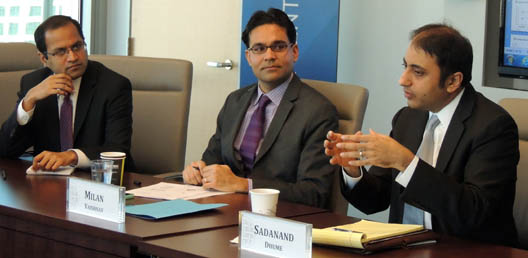 “Five months ago debates in India were centered around the predictions on who will win the upcoming election, but today, the discussions are more about how a BJP government [will] look,” said Milan Vaishnav, associate at the Carnegie Endowment for International Peace’s South Asia Program, at an event hosted by the South Asia Center. The Bharatiya Janata Party (BJP), the main rival to the Indian National Congress of Prime Minister Manmohan Singh, has gained strength in several state elections in the past two years. Many Indian commentators have attributed that gain to a lackluster performance by Singh’s government, and to the personal charisma of the BJP’s prime ministerial candidate, Narendra Modi.
“Five months ago debates in India were centered around the predictions on who will win the upcoming election, but today, the discussions are more about how a BJP government [will] look,” said Milan Vaishnav, associate at the Carnegie Endowment for International Peace’s South Asia Program, at an event hosted by the South Asia Center. The Bharatiya Janata Party (BJP), the main rival to the Indian National Congress of Prime Minister Manmohan Singh, has gained strength in several state elections in the past two years. Many Indian commentators have attributed that gain to a lackluster performance by Singh’s government, and to the personal charisma of the BJP’s prime ministerial candidate, Narendra Modi.
Sadanand Dhume, resident fellow at the American Enterprise Institute, agreed with Vaishnav’s prediction that BJP would likely win a majority of seats in the elections, which are to be held by May. Dhume suggested that media coverage has portrayed this election as a presidential-style contest, with a heavy focus on the leading personalities — notably Modi and Rahul Gandhi, the scion of the Congress’ dominant political family. Traditionally, attention in India has focused more on parties than on personalities, he said.
With no Indian party having won a governing majority outright since 1984, and regional parties having grown in strength, neither Congress nor the BJP is likely to be able to form a post-election government without assembling a coalition of partners. While some commentators have suggested that Modi may face difficulty in forming an effective coalition, Dhume argued that except for the country’s Left Front, Indian parties would be ready to join the BJP if it won enough seats to lead a government.
A decade after Gandhi entered politics by taking the parliament seat once held by his father, former Prime Minister Rajiv Gandhi, he has failed to inspire the imagination of the public, Dhume said. While the Congress has pushed Gandhi forward as a possible successor to Singh, the party has lost seats in key state elections, often despite high-profile campaigning by Gandhi. This has raised questions about whether Gandhi may now represent a liability for the party.
The anti-corruption movement that rocked New Delhi in 2011 led to the creation of the Aam Aadmi (Common Man) Party, and its victory last year in forming a state government in Delhi. While Aam Aadmi is not likely to win many seats in this spring’s national polls, Dhume said, its victory on an anti-corruption platform is likely to impact the election, having already prompted other contenders to rethink their models of governance and their social policies.
It will be corruption, along with economic growth and inflation, that will represent the core concerns of India’s voters this year as they choose their next government.
